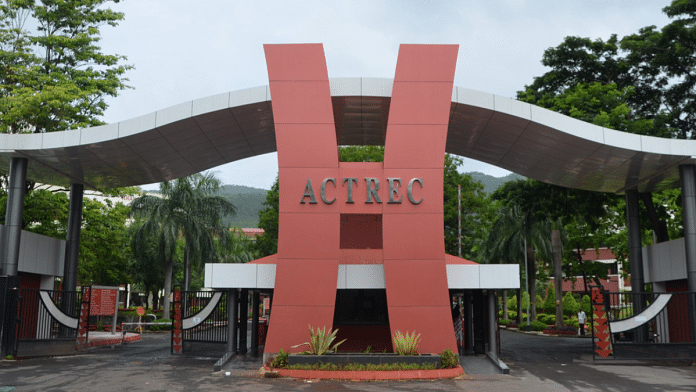New Delhi: Starting this week, one of India’s leading cancer hospitals, Tata Memorial Centre, Mumbai, is offering proton beam therapy — the most advanced form of radiation treatment that can be offered to specific types of cancer patients.
With this, Tata Memorial Centre has become the first government facility in the country to offer the therapy apart from the Apollo Proton Cancer Centre (APCC), a private centre in Chennai. According to a statement sent by Tata Memorial to ThePrint, though the plan to install the centre in Mumbai was first mooted in 2014, it was delayed by nearly a decade, mainly due to space constraints and then the Covid pandemic.
Proton beam therapy, which uses protons instead of X-rays used in traditional radiation treatment for cancer, is a cutting-edge radiation technology that has about 92 centres globally, most of them in Western countries. In 2019, the Apollo Hospitals group set up APCC, South Asia’s first such centre.
Though far costlier than traditional cancer therapy with the average cost per patient being around Rs 30 lakh, the advantage of proton beam therapy is that it allows a more targeted treatment of cancerous tumors while causing remarkably fewer side-effects.
Traditional treatment for cancer costs around Rs 5-20 lakh, depending on the hospital. At government hospitals, it could be less than Rs 5 lakh, too, depending on the rate of subsidy.
Speaking to ThePrint, Dr Rakesh Jalali, medical director and head of department, radiation oncology, APCC, said that while proton is the most sophisticated form of radiation treatment, generating it for use is a major technological and engineering challenge.
It also costs upward of Rs 100 crore to install a proton beam unit, said industry sources.
The sites where the therapy has been of maximum clinical benefit are paediatric cancers, central nervous system tumours, head and neck tumours (skull base and paranasal sinuses), bone and prostate cancers and soft tissue tumours, authorities at Tata Memorial told ThePrint, adding that research is currently underway to show its utility for other cancers.
According to the statement by Tata Memorial, 60 per cent of the patients who avail Proton treatment at the hospital will not need to pay any cost and about 40 per cent will have to pay about one-third of the standard rate for the treatment, which comes to nearly Rs 10 lakh. These rates are according to the treatment pricing policy followed by the hospital, depending on the income level of the patient.
Who can benefit from the treatment?
According to the World Health Organization guidelines, it is estimated that 50-70 per cent of all cancer patients may need radiation therapy sometime during the course of treatment.
Authorities at Tata Memorial Centre said that according to global statistics, nearly 15-20 per cent of patients receiving radiation therapy could potentially benefit from treatment using proton beams.
“In India, nearly 50,000 children are diagnosed with cancer every year,” said a senior official at the hospital, adding that, “Nearly 2,000 of them would potentially benefit from proton beams.”
Similarly, a much larger number of patients in the adult age group would also benefit from the cutting-edge therapy.
Indian Council of Medical Research’s cancer registry showed that there were an estimated 1.46 million cancer cases in the country in 2022.
Also Read: New drug for acute leukaemia leads 53% to complete or partial remission in US trials
What has the experience been like at APCC?
At Apollo’s Proton Cancer Centre, so far, nearly 1,000 patients have undergone treatment in the past four years, Jalali said.
The majority of cancer patients treated at APCC have historically been those with neurological cancers, said Jalali. However, the scope of proton therapy is now expanding to include the treatment of individuals with mouth, gastrointestinal, breast, lung, and prostate cancers, as well as cancers affecting soft tissues.
According to him, about 1-15 years ago, proton centres were relatively few and there was little access because it was difficult to maintain them.
“Setting up the centre is not enough, we need to maintain it and make sure that it runs 24/7 for years like any other major technological feat in medicine, engineering or space travel,” Jalali said. “Therefore, it was restricted to only 2-5 per cent of the cancer patient population and all the resources were put into paediatric cancer patients.”
According to him, while the tumour may be controlled with traditional radiation, the side effects are significant and the quality of life for such patients may be compromised as they grow up. “Protons were implemented in paediatric cancers for these reasons,” he said.
Jalali added that while paediatric cancers can be successfully treated in 70-80 per cent of cases, traditional radiation therapy can come with higher risks of side effects and chances of second cancers due to radiation exposure.
“Therefore, proton therapy was preferred for pediatric patients. But its utility has improved remarkably and is now being utilised beyond childhood cancers,” said Jalali.
(Edited by Richa Mishra)
Also Read: India accounts for 1 in every 5 cervical cancer cases, almost 1 in 4 deaths, finds Lancet study



